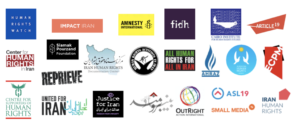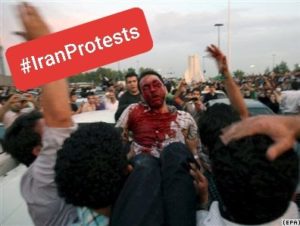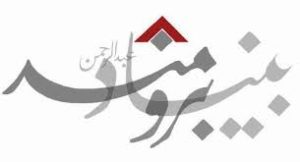Prominent Iranian artists, inside and outside the country, have reacted to the brutal crackdown of recent protests in Iran, The Independent reports (HT:FDD).
Amnesty International says Iranian authorities are continuing a “brutal campaign of repression” following last month’s nationwide protests during which at least 304 people were killed, RFE/RL adds (above). In a statement published on December 16, the London-based human rights watchdog said the authorities were carrying out a “vicious crackdown,” arresting thousands of protesters, journalists, human rights defenders, and students to “stop them from speaking out about Iran’s ruthless repression.”
 A coalition of international human rights organizations has called on the UN Human Rights Council (HRC) to launch an independent inquiry and demand accountability for the Iranian government’s repression of last month’s street protests. Signatories include the Abdorrahman Boroumand Center for Human Rights in Iran, ARTICLE 19, Cairo Institute for Human Rights Studies, FIDH – International Federation for Human Rights and the Siamak Pourzand Foundation.
A coalition of international human rights organizations has called on the UN Human Rights Council (HRC) to launch an independent inquiry and demand accountability for the Iranian government’s repression of last month’s street protests. Signatories include the Abdorrahman Boroumand Center for Human Rights in Iran, ARTICLE 19, Cairo Institute for Human Rights Studies, FIDH – International Federation for Human Rights and the Siamak Pourzand Foundation.
That the Islamic Republic cannot reform itself is the key headline of 2019, says Alex Vatanka, a Senior Fellow at the Middle East Institute:
The security forces, led by the Revolutionary Guards, killed more protesters in seven days than they did during the seven months of protests by the Green opposition movement in 2009. In this bloody crackdown, there was no daylight between the so-called “moderates” and “hardliners.” All factions within the regime backed the crackdown, which can be said to be the final nail in the coffin of the reformist movement.
And yet, the exiled Iranian opposition, despite deep anger, remained fragmented, Vatanka @AlexVatanka adds. The opposition in diaspora still needs to agree on a basic common vision and blueprint for the future of Iran.

Iran-based sociologist Taqi Azad Armaki has warned that the intensification of the security situation in Iran following recent protests could lead to a social explosion within a year a two, Radio Farda reports:
Following the mid-November unrest that was ignited by a sharp rise in the price of gasoline but soon turning into an anti-regime political upheaval, pundits in Iran have been warning officials against heavy-handed treatment of protesters who are fed up with corruption, discrimination and social injustice. On the other hand, some hardliner figures insist on the continuation of non-democratic ways that can potentially further escalate the situation.
Armaki suggests in an interview with pro-reform website Fararu that Iran needs a civil society rather than a security society to avert the volatile situation that makes the country prone to unrest.
Like the Soviet Union thirty years ago, the Iranian regime sooner or later will crumble under the weight of its own failures. For the United States to try to accelerate that process by impoverishing the country and placing the regime before an existential threat is a huge gamble, some analysts suggest.
 Protests erupted in more than 100 Iranian cities last month, sparked by the government’s decision to triple the price of gasoline, the Brookings Institution adds. The unrest comes as Tehran struggles to navigate U.S. economic pressure applied since the Trump administration’s withdrawal from the 2015 nuclear deal and an increasingly tumultuous environment across the broader Middle East.
Protests erupted in more than 100 Iranian cities last month, sparked by the government’s decision to triple the price of gasoline, the Brookings Institution adds. The unrest comes as Tehran struggles to navigate U.S. economic pressure applied since the Trump administration’s withdrawal from the 2015 nuclear deal and an increasingly tumultuous environment across the broader Middle East.
Iran’s security chief Ali Shamkhani has claimed that “85 percent of protesters shot to death in the Tehran County during the mid-November anti-government protest had nothing to do with protest gatherings,” adds Radio Farda (HT: FDD).
Ahwazi activist Rahim Hamid details the Iranian regime’s particularly brutal crackdown on protesters during the past month in Ahwazi areas. Iran’s focus on this area is likely the result of it being the seat of its petrochemical industry, along with longstanding discrimination against Ahwazi Arabs, he writes for the Washington Institute’s Fikra Forum.
 On December 18, the Center for Middle East Policy at Brookings will host a discussion on the unrest in Iran, what it means for the future of the country and the region, and how the United States and the international community should respond. Washington Post Columnist David Ignatius will lead a conversation featuring journalist and filmmaker Maziar Bahari, whose memoir of his own imprisonment in Iran was the basis for the 2014 film “Rosewater.” Ignatius and Bahari will be joined by Brookings Senior Fellow Suzanne Maloney. Following the discussion, the panelists will take questions from the audience.
On December 18, the Center for Middle East Policy at Brookings will host a discussion on the unrest in Iran, what it means for the future of the country and the region, and how the United States and the international community should respond. Washington Post Columnist David Ignatius will lead a conversation featuring journalist and filmmaker Maziar Bahari, whose memoir of his own imprisonment in Iran was the basis for the 2014 film “Rosewater.” Ignatius and Bahari will be joined by Brookings Senior Fellow Suzanne Maloney. Following the discussion, the panelists will take questions from the audience.
Wednesday, December 18, 2019, 2:00 – 3:30 p.m. The Brookings Institution, Falk Auditorium, 1775 Massachusetts Ave, NW, Washington, DC. RSVP







